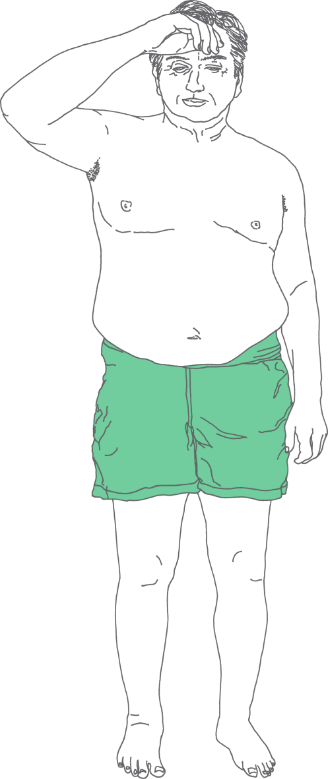What are the symptoms of hypogonadism (low testosterone)?
Symptoms and signs of testosterone deficiency occur as a result of low testosterone levels and hence, may benefit from testosterone therapy (regardless of whether there is an identified underlying aetiology).1-6
Insufficient testosterone action (even at normal testosterone levels) can be caused by less sensitive androgen receptors (which is genetically determined)1,7 or elevated SHBG levels (which binds to testosterone and reduce the free “active” serum fraction of testosterone.8
Due to the multiple effects of testosterone, the health consequences of hypogonadism are wide-ranging with signs and symptoms affecting sexual, physical, metabolic and psychological domains.
Metabolic
symptoms / signs
- Obesity (BMI 30 or higher)
- Abdominal obesity (waist circumference 94-102 cm or higher)
- Metabolic syndrome
- Insulin resistance, prediabetes or type 2 diabetes
Sexual symptoms
- Decreased sexual desire and activity
- Decreased frequency of sexual thoughts
- Erectile dysfunction
- Delayed ejaculation
- Decreased volume of ejaculate
- Decreased frequency or absent morning or night-time erections
- Small testes
- Infertility

Psychological symptoms
- Depressed mood
- Loss of energy
- Reduced motivation
- Poor concentration
- Decreased well-being and/or poor self-rated health
- Irritability
- Sadness
- Impaired memory
- Decreased cognitive function (including impaired concentration, verbal memory, and spatial performance)
Physical symptoms
- Decreased muscle mass and strength
- Reduced physical performance
- Hot flushes or sweats
- Sleep disturbances
- Fatigue
- Reduced bone mineral density, osteoporosis, low trauma fractures
- Decreased body hair
- Gynecomastia
References
- Dean JD, et al. J Sex Med. 2015;12(8):1660–86.
- Morgentaler A, et al. Mayo Clin Proc. 2016;91(7):881–96.
- Mulhall JP, et al. J Urol. 2018;200(2):423–32.
- Hackett, G., Kirby, M., Rees, R. W., Jones, T. H., Muneer, A., Livingston, M., ... & Ramachandran, S. (2023). The British Society for Sexual Medicine guidelines on male adult testosterone deficiency, with statements for practice. The world journal of men's health, 41(3), 508.
- Salonia A, et al. EAU Guidelines on Sexual and Reproductive Health: 2023 update. Available at: https://uroweb.org/guidelines/sexual-and-reproductive-health. Accessed May 2024.
- Morales A, et al. CMAJ. 2015;187(18):1369–77. Supplementary Appendix.
- Zitzmann M. Nat Clin Pract Urol. 2007;4(3):161–6.
- Krakowsky Y, et al. Eur Urol Focus. 2019;5(2):273–9.





Recommendations